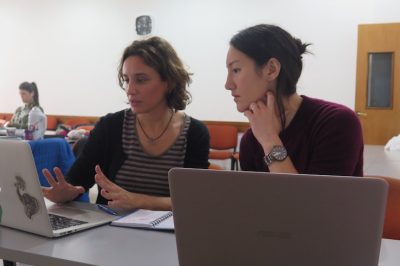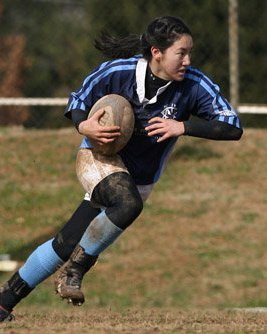Our People: Caitlin R. Williams
Caitlin R. Williams embodies practical idealism.
Name: Caitlin R. Williams
Position: Doctoral student, Department of Maternal and Child Health
Time at the Gillings School: I’m in the second year of my doctoral program, but I also earned my undergrad and master’s degrees at UNC.

Caitlin, at right, works with a colleague to build a sex ed app.
What I do at UNC Gillings (and why I love it): Broadly, I work on sexual and reproductive health. I chose to study at the Gillings School because even the faculty at competitor schools said this is the best place to work at the intersection of global sexual and reproductive health and implementation science. In a nutshell, implementation science is based on the fact that, for many public health issues, we already know what to do to cure or prevent a problem. What we don’t always know is how to get those proven solutions to the people who desperately need them – that’s where implementation scientists come in to bridge the gap.
Professionally, I love the Gillings School because I totally connect with Dean Rimer’s belief that our faculty and students are “practical idealists.” I like to think that that phrase speaks to my own personality, but more importantly, it speaks to the kind of changemakers we need if we are to rise to the challenges before us. It’s exciting to be around so many people who share my drive to push hard for what is possible now, while still leaning in to what may be possible tomorrow, or in five years, or in twenty. Personally, I love being here because the quality of life is just fantastic. I’ve lived and worked a lot of places, and what stands out about my colleagues at UNC is that they’re both extraordinarily brilliant and extraordinarily kind.
The pivotal moment that led my to public health: took place during the summer between my sophomore and junior years, when I was still pre-med and planning to become an OB-GYN. I was working a five-week rotation on the maternity ward in a rural South African hospital. While I loved it, I couldn’t help but notice that the challenges we faced were structural, not clinical. Just to give a quick example, about 75 percent of our patients were HIV-positive, but we didn’t have gloves. Someone higher up had made the decision that they just weren’t a priority. The general attitude of the doctors was that you prayed and hoped to be lucky enough not to contract the virus, and there was a funeral for a nurse literally every few weeks. I realized then that I could become a good doctor, but not a great one, and one more good doctor wasn’t going to fix this. I decided to become the person who could solve the problem of the gloves – and not just in one hospital.
When I was little, I wanted to grow up and be: an actress. I didn’t care which kind – I just wanted to be famous! Now, I’m really happy with my work, and I’d much rather be left alone in a cubicle to get on with my research.

Caitlin shows her intensity during a rugby match.
My passions outside public health are: cooking and rugby. With cooking, I say that I’m not a foodie, I’m just an eater! I’ll eat anything. I do love to cook from scratch, though, because that’s how my mom taught me: You make the bread, you make the tomato sauce, you bring all the elements together and it’s so satisfying and meditative. On the other end of the spectrum, there’s rugby, which I played when I was an undergrad here. We went to nationals all four years. I loved the position of “scrum-half,” which is a perfect role for the smallest and most aggressive (aka loud-mouthed) person on the team!
A project I’m currently working on: is an app to spread comprehensive sex education throughout Argentina. This is a perfect example of implementation science. Since 2006, Argentina has had both a vetted sex ed curriculum and a federal mandate to implement the program in every public and private school. That said, issues with policy rollout and differing religious beliefs mean that, for most students, comprehensive sex ed exists in name only.
As of now, about 15 percent of babies in Argentina are born to mothers ages 20 and younger. Girls have told me about turning to Google to research questions they were too embarrassed to ask their parents or friends, and then being terrified because they couldn’t figure out if the information they found was accurate. So, with the support of Grand Challenges Canada, I’m working with colleagues at the Institute of Clinical Effectiveness and Health Policy in Argentina (IECS—Argentina) to transform the existing, high-quality sex ed content into an app. We know that almost every adolescent in Argentina owns a smart phone, so we have a good chance of scaling this intervention if it proves successful. Local teens are co-designing the app with us, and our hope is to create something effective that we can gradually roll out to those who need it most.
Read more “Our People” interviews.
